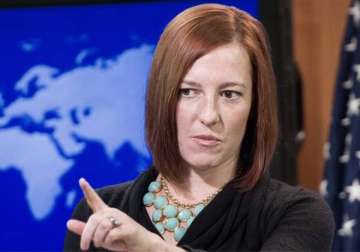Vienna: Iran nuclear talks moved up a gear tonight as US Secretary of State John Kerry and Iran's foreign minister stayed on in Vienna to try and break a deadlock days before a deadline.
Kerry had been set to leave Vienna and sources had said Mohammed Javad Zarif was considering returning to Tehran, but both remained in the Austrian capital.
“Kerry has delayed his departure (for Paris)... in order to continue consultations” with Zarif, Kerry's spokesperson Jen Psaki said before the two men went into a meeting lasting over two hours.
“We have not yet determined when we will depart, but will stay in Vienna overnight.”
Zarif, whose possible trip back to Iran for “consultations” had suggested possible progress, said that world powers made “no significant propositions worth returning to Tehran with”.
Iran and the six powers—the US, China, Russia, Britain, France plus Germany (P5Ư) -- have been negotiating intensively since February to turn an interim accord reached with Iran a year ago into a lasting agreement by November 24.
Such a deal, after 12 years of rising tensions, is aimed at easing fears that Tehran will develop nuclear weapons under the guise of its civilian activities—an ambition the Islamic republic hotly denies.
British Foreign Secretary Philip Hammond left Vienna in the afternoon—saying there was still a “very significant gap”—but France's Laurent Fabius was still in the Austrian capital after meeting Zarif for an hour and a half.
“The prize for Iran is huge,” Hammond said.
He called for more flexibility from the Iranians and said that “in return we're prepared to show some flexibility on our side”.
Fabius, seen as one of the most hardline among the P5Ư, called on Iran to “seize this opportunity”.
Russian Foreign Minister Sergei Lavrov, a crucial player, said from Moscow that “all the elements are already on the table” for a deal and that all that was missing was “political will”.
Kerry later “updated Foreign Minister Lavrov on the state of negotiations” by phone, the US official said.
Most analysts expect Iran and the six powers to decide to put more time on the clock—as they did with an earlier deadline of July 20 -- possibly by agreeing a new interim deal.
Hammond had said on Wednesday that he was “not optimistic” the deadline could be met, suggesting that the best hope was for another extension—and only provided there was “significant movement”.
But Kerry yesterday insisted this was not on the table.
Latest World News

